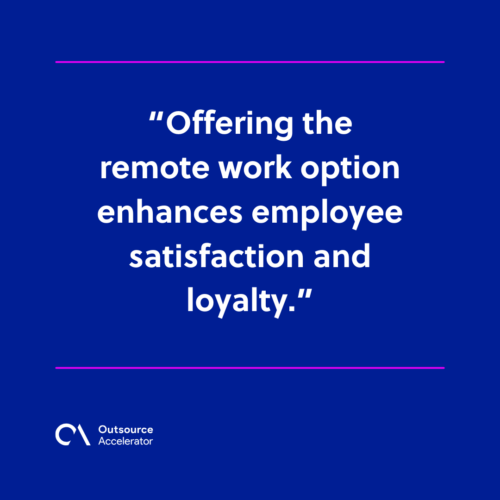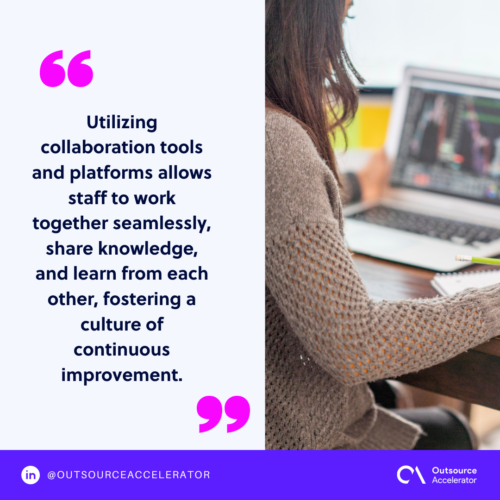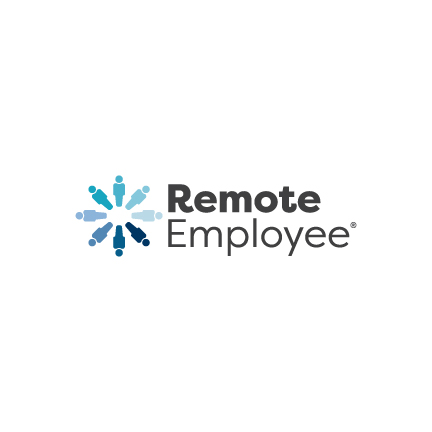5 powerful remote employee development practices

5 ways to promote remote employee development
Remote employee development refers to the process of fostering the skills, knowledge, and growth of employees who work outside of a traditional office environment.
This concept has gained significant importance with the rise of remote work, accelerated by advances in technology and recent global events.
Business process outsourcing providers like Remote Employee help firms hire, train, and manage top-tier remote workers who can fuel their growth.
As a trusted BPO, Ruffy Galang, Remote Employee’s CEO, has this to say. “We believe that happy employees are productive employees. We’ve all had a miserable job at one point. Nobody’s at their best when they’re miserable.”
Promoting remote employee development involves creating structured programs. Employers must also provide resources that enable virtual staff to grow professionally despite being physically separated from their colleagues and supervisors.
In this blog, we will delve into the importance of remote employee development and explore effective strategies firms can use to cultivate growth among their remote workforce.
Why should businesses cultivate remote employee development?
Offering the remote work option enhances employee satisfaction and loyalty. In fact, Flexjob’s survey of 8,600 professionals revealed that 63% of respondents declared working remotely to be one of the most vital aspects of their jobs.

Further, here are several other reasons why businesses should cultivate remote employee development:
Enhanced productivity
When you give remote employees opportunities for professional growth, they become more skilled and efficient
Continuous development keeps them up-to-date with the latest industry trends and technologies, leading to increased productivity.”
Employee retention
Investing in employee development shows a company’s commitment to its workforce.
Remote employees who feel valued and see a clear path for career advancement are more likely to stay with the company, reducing turnover rates.
Improved employee engagement
Development programs can significantly boost engagement among remote employees.
When employees have access to training and growth opportunities, they are more motivated and connected to their work and the company’s mission.
Competitive advantage
A well-trained remote workforce can give a company a competitive edge.
Employees who continuously develop their skills are better equipped to innovate and adapt to market changes, helping the company stay ahead of competitors.
Building a strong company culture
Remote work can sometimes lead to feelings of isolation and disconnect.
By fostering development, companies can build a sense of community and shared purpose, strengthening the overall company culture even in a dispersed work environment.
Remote employee development programs help businesses ensure that their remote teams are not only surviving but thriving.
5 ways to nurture remote employee development
Here are five ways to foster remote employee development:
1. Provide access to online training and resources
Offering a variety of online courses, webinars, and learning platforms allows remote employees to develop new skills at their own pace.
Providing high-quality training resources supports continuous learning and skill enhancement, tailored to individual career goals and company needs.
2. Implement mentorship programs
Connecting remote employees with mentors can significantly enhance their professional growth.
Mentorship programs provide guidance, support, and valuable insights, as these help employees navigate their career paths and develop leadership skills.
Virtual mentorship sessions can be scheduled regularly to ensure ongoing support.
3. Encourage regular feedback and performance reviews
Conducting regular performance reviews and providing constructive feedback helps remote employees understand their strengths and areas for improvement.
Setting clear goals and expectations, along with frequent check-ins, ensures employees stay on track and are continuously developing their skills.
4. Foster a collaborative work environment
Creating opportunities for remote employees to collaborate on projects and initiatives can boost their problem-solving and teamwork skills.
Utilizing collaboration tools and platforms allows staff to work together seamlessly, share knowledge, and learn from each other, fostering a culture of continuous improvement.

5. Support career advancement opportunities
Promoting from within and providing clear career advancement paths motivates remote workers to develop their skills and pursue growth opportunities.
Offer programs such as leadership training, role rotations, and cross-departmental projects. These enable them to expand their expertise and prepare for future roles within the company.
By implementing these strategies, businesses can effectively promote the development of their remote work environment, ensuring virtual staff remain engaged, skilled, and motivated.
This not only benefits the employees but also contributes to the overall success and competitiveness of the company.
Build top-tier virtual teams with Remote Employee
Remote Employee offers a seamless solution for building highly qualified virtual teams.
Businesses can leverage a skilled and educated workforce from the Philippines, reduce operating costs, improve scalability, and maintain high standards of service.
Remote Employee’s platform simplifies the hiring process as it ensures your remote team integrates smoothly into your operations.
Ready to take your remote workforce to the next level? Visit Remote Employee to learn more and start building your top-tier virtual team today!







 Independent
Independent




